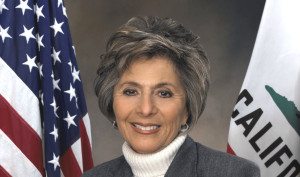Sen. Barbara Boxer’s (D-Calif.) the decision to delay Senate Foreign Relations Committee’s consideration of Matt Bryza’s controversial nomination as U.S. ambassador to Azerbaijan is the latest chapter in a 20-year history to ensure a balanced U.S. policy toward the Caucasus region that respects the right of the people of Karabagh to self-determination.

Her years in the House of Representatives fighting for Armenian Genocide legislation are well documented. In 1991, with a newly independent Armenia and a Karabagh independence movement in full swing, Boxer was among the first Congressional Members to travel to Armenia to personally assess the situation there and advise her colleagues about the plight of the fledgling democracy.
Her pursuit of answers to crucial questions for Bryza—from cross-examining him during the July 22 hearing to submitting detailed follow-up written questions—has its roots in her keen knowledge and understanding of the issues and the region.
So, when Boxer placed a hold on a vote for approval of Bryza’s nomination, she was truly dissatisfied at the answers Bryza gave to her questions and that of others in the Senate Foreign Relations Committee.
Long before Bryza slithered his way into the upper echelons of the Azeri government and cozied up to the Baku elite, Boxer was on the trenches advocating assistance to Armenia, security for Nagorno-Karabagh citizens, advancement of U.S.-Armenia relations, and recognition of the Armenian Genocide.
Realizing the devastating effects of Azerbaijan’s 20-year blockade of Armenia and Karabagh, she has been a vocal advocate for Section 907 and restrictions on U.S. assistance to that country. In 1999, when Section 907 came under attack from the Clinton Administration, the Azerbaijani lobby, and the oil industry, she fought back against efforts to weaken or repeal this much-needed law. Boxer was adamant: “We believe that Section 907 made sense when it was enacted and that it continues to make sense today. To waive it in the absence of any progress toward a lifting of the blockade would reward the Government of Azerbaijan for its intransigence and remove a major incentive for good-faith negotiation from one side in the conflict.”
Learning of the Azerbaijani destruction of the 1,300-year-old Armenian cemetery in Djulfa in 2006, Boxer pressed then-U.S. ambassador to Azerbaijan nominee Anne Derse on the topic and U.S. Ambassador to Azerbaijan Reno Harnish, for not visiting the site of the destruction despite efforts by the European Union to address the matter.
Similarly, in successive nomination hearings for U.S. ambassador to Turkey nominees James Jeffery and, now, Francis Ricciardoni, as well as U.S. ambassador to Armenia nominees Dick Hoagland and Marie Yovanovitch, Boxer consistently took her Senate oversight responsibilities seriously, asking tough questions about U.S. policy on the Armenian Genocide and Turkey’s blockade of Armenia.
Boxer questioned Hoagland during the confirmation process, and voted in Committee against his nomination, which was eventually the subject of two “holds” by Senator Rob Menendez (D-N.J.) and later withdrawn by then-President George W. Bush. She noted, at the time, referencing former U.S. Ambassador to Armenia John Evans’ statement in February 2005 properly characterizing the Armenian Genocide as “genocide,” that: “I agree with Ambassador Evans’ statement. Not only should we not play word games with a matter as serious as genocide, we should also not play political games with issues of genocide.” The ultimate failure of the Hoagland nomination was due, in large part, to his denialist response to a written question about the Armenian Genocide submitted by Boxer.
Bryza’s responses to questions from Boxer and other Senate leaders are unsatisfactory at best and reveal his inability to represent U.S. interests in the region, without his conflict of interests and prejudices getting in the way.
Boxer should be praised for her leadership on delaying the Bryza vote and acknowledged for her continued support of Armenian American issues in Congress. She should also be called upon to oppose the nomination and ensure that the right person is representing U.S. interests in the Caucasus.


She should have blocked the nomination and not merely put a hold on it for an up or down vote. She has the power to fillabuster, why didn’t she threaten to do so after receiving Bryza’s written statment?